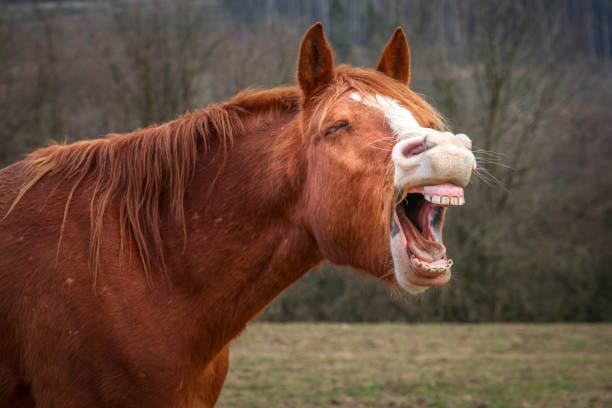Why Do Horses Whinny?
Horses are social animals, and whinnying is one of the primary ways they communicate. When you hear a horse whinny, it’s not just noise—it’s a message. Whinnying is a form of vocal communication that horses use for various reasons, whether they’re interacting with other horses or with humans.
What is Whinnying?

A whinny, also known as a neigh, is a high-pitched sound that horses make. It can last anywhere from a few seconds to longer, depending on the horse and the situation. This vocalization is often loud and can carry over long distances, which is why horses use it to communicate with others in their herd or with people in the area. A horse’s whinny is unique, much like a human’s voice, and you can often tell which horse is making the sound.
1. Communication Between Horses
One of the main reasons horses whinny is to communicate with other horses, especially when they are separated. In the wild or on a large farm, horses may whinny to find their friends, family, or herd members. For example, a mare might whinny to call for her foal, or a horse might call out to others when it feels isolated or lost. Whinnying helps horses locate each other, especially in open spaces.
When horses are kept in stables or fenced areas, they often whinny when they see or hear other horses nearby. This can be a way to say “hello” or “I’m here,” and it can help establish a connection with others in the group.
2. Seeking Attention
Horses are intelligent and social animals that enjoy human interaction. If a horse whinnies when you approach, it might be trying to get your attention. Horses often whinny when they want food, companionship, or simply to interact with you. For example, a horse may whinny in the morning when it expects to be fed, or it may whinny when it sees you coming to take it for a ride or to the pasture.
Whinnying is also a way for horses to express excitement or anticipation. If they know you are about to do something they enjoy, like grooming or taking them for a walk, they might whinny in excitement. It’s a way for the horse to tell you it’s happy to see you and ready for some action.
3. Feeling Anxious or Nervous
Whinnying can also be a sign of anxiety or stress. Horses are creatures of habit, and they can become uneasy when things change. For instance, a horse might whinny if it’s placed in a new environment or if it’s away from its familiar companions. In this case, the whinny may be a way for the horse to express its discomfort or to call out for reassurance from its herd.
When horses are alone, they may whinny to express loneliness. Horses are social animals, and they don’t like being isolated for long periods. If a horse hears another horse whinnying in the distance, it might answer back to reassure itself or to keep track of where the other horse is.
4. Expressing Joy or Playfulness
Horses can also whinny when they are in a playful or happy mood. Just like dogs may bark or wag their tails when they are excited, horses can whinny to express their joy. When horses are out in the field, playing with each other or enjoying the freedom of running, you might hear them whinny as part of their playful behavior.
If a horse is introduced to a new environment that it enjoys, such as a new field or stable, it might whinny in excitement as it explores. This is similar to how a horse may call out to other horses when it finds something interesting or new.
5. Warning or Alarm
Sometimes, horses whinny as a form of warning. This type of whinnying can occur when the horse feels threatened or sees something unfamiliar that could pose danger. In the wild, a horse’s whinny could alert the rest of the herd to a potential predator or other threats. Domestic horses may whinny when they feel uneasy about a strange noise, new animals, or unfamiliar people.
For example, if a horse sees a strange dog or hears something unexpected, it might whinny to alert its herd mates or to signal to humans that something is off. This kind of vocalization is usually louder and more urgent than the friendly whinnies horses use to communicate with one another.




